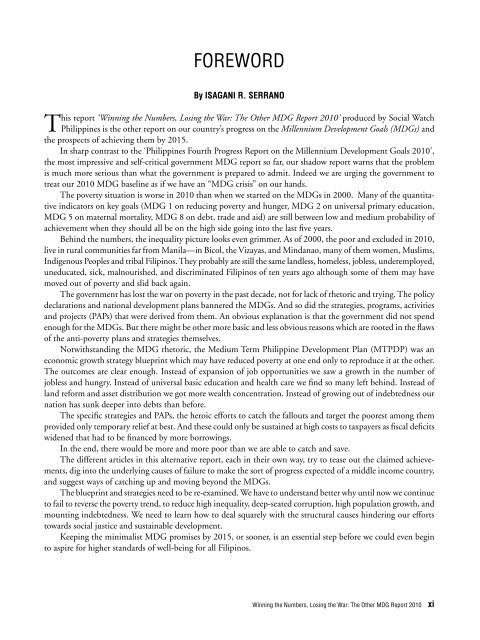Report - Social Watch Philippines
Report - Social Watch Philippines
Report - Social Watch Philippines
You also want an ePaper? Increase the reach of your titles
YUMPU automatically turns print PDFs into web optimized ePapers that Google loves.
FOREWORD<br />
By ISAGANI R. SERRANO<br />
This report ‘Winning the Numbers, Losing the War: The Other MDG <strong>Report</strong> 2010’ produced by <strong>Social</strong> <strong>Watch</strong><br />
<strong>Philippines</strong> is the other report on our country’s progress on the Millennium Development Goals (MDGs) and<br />
the prospects of achieving them by 2015.<br />
In sharp contrast to the ‘<strong>Philippines</strong> Fourth Progress <strong>Report</strong> on the Millennium Development Goals 2010’,<br />
the most impressive and self-critical government MDG report so far, our shadow report warns that the problem<br />
is much more serious than what the government is prepared to admit. Indeed we are urging the government to<br />
treat our 2010 MDG baseline as if we have an “MDG crisis” on our hands.<br />
The poverty situation is worse in 2010 than when we started on the MDGs in 2000. Many of the quantitative<br />
indicators on key goals (MDG 1 on reducing poverty and hunger, MDG 2 on universal primary education,<br />
MDG 5 on maternal mortality, MDG 8 on debt, trade and aid) are still between low and medium probability of<br />
achievement when they should all be on the high side going into the last fi ve years.<br />
Behind the numbers, the inequality picture looks even grimmer. As of 2000, the poor and excluded in 2010,<br />
live in rural communities far from Manila—in Bicol, the Vizayas, and Mindanao, many of them women, Muslims,<br />
Indigenous Peoples and tribal Filipinos. They probably are still the same landless, homeless, jobless, underemployed,<br />
uneducated, sick, malnourished, and discriminated Filipinos of ten years ago although some of them may have<br />
moved out of poverty and slid back again.<br />
The government has lost the war on poverty in the past decade, not for lack of rhetoric and trying. The policy<br />
declarations and national development plans bannered the MDGs. And so did the strategies, programs, activities<br />
and projects (PAPs) that were derived from them. An obvious explanation is that the government did not spend<br />
enough for the MDGs. But there might be other more basic and less obvious reasons which are rooted in the fl aws<br />
of the anti-poverty plans and strategies themselves.<br />
Notwithstanding the MDG rhetoric, the Medium Term Philippine Development Plan (MTPDP) was an<br />
economic growth strategy blueprint which may have reduced poverty at one end only to reproduce it at the other.<br />
The outcomes are clear enough. Instead of expansion of job opportunities we saw a growth in the number of<br />
jobless and hungry. Instead of universal basic education and health care we fi nd so many left behind. Instead of<br />
land reform and asset distribution we got more wealth concentration. Instead of growing out of indebtedness our<br />
nation has sunk deeper into debts than before.<br />
The specifi c strategies and PAPs, the heroic efforts to catch the fallouts and target the poorest among them<br />
provided only temporary relief at best. And these could only be sustained at high costs to taxpayers as fi scal defi cits<br />
widened that had to be fi nanced by more borrowings.<br />
In the end, there would be more and more poor than we are able to catch and save.<br />
The different articles in this alternative report, each in their own way, try to tease out the claimed achievements,<br />
dig into the underlying causes of failure to make the sort of progress expected of a middle income country,<br />
and suggest ways of catching up and moving beyond the MDGs.<br />
The blueprint and strategies need to be re-examined. We have to understand better why until now we continue<br />
to fail to reverse the poverty trend, to reduce high inequality, deep-seated corruption, high population growth, and<br />
mounting indebtedness. We need to learn how to deal squarely with the structural causes hindering our efforts<br />
towards social justice and sustainable development.<br />
Keeping the minimalist MDG promises by 2015, or sooner, is an essential step before we could even begin<br />
to aspire for higher standards of well-being for all Filipinos.<br />
Winning the Numbers, Losing the War: The Other MDG <strong>Report</strong> 2010 xi


